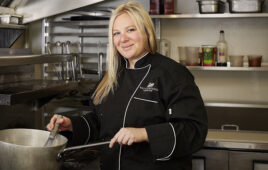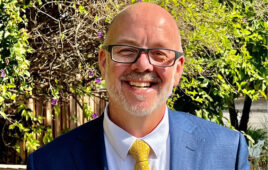The Union Club of Cleveland’s Lawrence McFadden, CMC, GM/COO, offers sage advice for managers forming their response plans to the coronavirus crisis.
One of my favorite quotes is from one of my personal heroes, Colin Powell. “Never let your ego get so close to your position that when your position goes, your ego goes with it,” he said.
Planning during a crisis isn’t about being right or about being followed. Planning allows the team to be heard and to have natural ideas percolate into actions. It takes a strong leader to navigate these difficult times. It takes patience, agility and adaptability.
The current situation with COVID-19 is especially challenging for chefs and managers who are used to immediacy and action. Our product quality and effectiveness can be seen and tasted during normal business. But when we’re in a crisis leadership mode, we have to shift gears and focus on inclusion, planning and preparation. We must also accept that our efforts may not be appreciated until months later, if ever.
The quick and clear organization of processes has always been the hallmark of a kitchen. Perishable products come in the back door and finished plates go out the front. It’s a race against the clock as we balance reservations with execution. But with the current COVID-19 crisis, we must find a way to adapt those processes. We must shift to a platform that organizes all the “what if” scenarios.
It’s almost like the old banquet production slogan: Hurry up and wait.
Our biggest challenges here at the Union Club spin off of the “what ifs,” “how abouts,” and “if that happens” type scenarios. Having been in a few of these crisis strategy sessions in the past, I try to convey to my team that unproductivity is only measured if we don’t have a plan.
I remember in the 80s, how the financial crisis restructured the Greenbrier, and other locations. In the early 90s, the Gulf War brought uncertainty and cost-cutting measures to my employment with Intercontinental Hotels. I remember sitting in the cafeteria at the Fairmount Hotel with a colleague on the Olympic team when CNN broadcasted the Gulf War strike. During my tenure with the Ritz Carlton, Naples hurricanes came to South Florida almost annually. They consistently brought panic, delays, cancelations, and layoffs. This was the cost of living in a paradise with white beaches and sunsets. I remember on 9/11, I was standing in my VP’s office when the second tower fell. I headed back to the kitchen with potentially no business on the books going into the holiday season. There were hundreds of staff members waiting and responding to directives. It was intense. Social media was just getting its legs then, so soundbites were out and about, but the noise was not yet overwhelming. Next came the economic downturn of 2008, with the bottom falling out of the stock market as well as disposable incomes disappearing. The entertainment industry was the hardest hit.
This brings us to 2020, with the Coronavirus pandemic and all the uncertainty. Some business will rebound after the downturn, some won’t. But there is one thing considerably different about this crisis compared to the others listed above. The entire world is in it with us this time. No country or continent is being spared. I hope that allies will be born out of this common challenge. And I know that innovations will rise.
This week, we have had a handful of ad hoc group meetings with key board members to act quickly on behalf of the members of the Union Club. We continue to hold daily meetings with management staff, either on property or from home, so that we can connect and share information and ideas for how we’ll move forward.
The front desk is calling each of our staff members every day to check on their well-being and needs. I’ve asked them to remind our team members that hey are not just a number. We ask our employees to enhance the member experience by anticipating their needs and wants. We need to make this a practice with each other now and tomorrow.
Historical documentation is key, both in sales and budgeting, but it’s also critical for remembering similar challenges and results from the past. Each manager at the club has a key objective—to document his or her area and update the general ledger for future education and advisement.
Lastly, and perhaps the most importantly, Arnaud Berthelier, CMC, our Executive Chef, is continuing to cook warm, safe meals for the staff who continue to work at the club. Breaking bread together or alone, laughing, crying and chatting up nervous energy is so important right now.
Yesterday, I walked up to the kitchen to thank our Chef for all he has done. I found him washing the china, silverware, and pots from the family meal. I stood there mesmerized. This Master Chef has Michelin and Mobil Five Star recognition and here he was, washing dishes.
It was a humbling reminder that we all must do our part, no matter how big or small.



